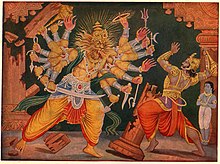Sriyadavaksitibhrdisavisalavaksah
saudhantarojjvalamanoharadivyamurte
ksirambudhipriyasute pranatestadatri
yadvadrinathadayite! tava suprabhatam. 1
Kalyanatirthamavagahya sutirthapurna
sauvarnabhadrakalasan sirasa vahanta
tisthanti vaidikasikhamanayah prahrsta
yadvadrinathadayite! tava suprabhatam. 2
etepi naradamukhassuravainikasca
tvatpadapankajavilinanijantarangah
gayanti te gunaganannigamantagamyan
yadvadrinathadayite! tava suprabhatam. 3
indranalantakamukhasca disamadhisah
samprapitonnatapadastvadapangalesaih
tvam samstuvanti vihitanjalayah prakamam
yadvadrinathadayite! tava suprabhatam. 4
devi! tvaya sucaritasya sute prasada-
dyadrgvidhah prakatitah karunatarangah
tadrgvidhaniha tarangaya mayyapangan
yadvadrinathadayite! tava suprabhatam. 5
yairunnatim samagamanna ca sankaradyah
yanihate harirapi trijagadvidhane
matastvamadya samudancaya tanapangan
yadvadrinathadayite! tava suprabhatam. 6
sadyah praphullakarapadmagalanmadhula-
panonmukha madhukarastava suprabhatam
samsanti jhankrtimisena kiladya devi!
yadvadrinathadayite! tava suprabhatam. 7
karanavatamsitasarojayuge praphulle
sadyassamumisadapangaparamparaste
nispandapustarasapanaratalimala-
lilam vihanti kamale tava suprabhatam. 8
daridryadavadahanantaratapyamana-
khedapanodanadhurinakataksapure!
utphullapankajadalayatalocanante
yadvadrinathadayite! tava suprabhatam. 9
jayatu jayatu devi devasanghadipujya
jayatu jayatu padma padmasadmabhivandya
jayatu jayatu nitya nirmalajnanavedya
jayatu jayatu satya sarvabhutantarastha. 10
suprabhatamidamapramattadhih
yah prabhatasamaye pathennarah
ksiprameti sakalanabhipsitan
dirghamayuratha sasvatam padam. 11
svami susilassulabhassarvajnassarvasaktidhrt
vatsalo yatsahayastam vande yadugirisvarim. 12
iti sri yadugirinayika suprabhatam samaptam||
saudhantarojjvalamanoharadivyamurte
ksirambudhipriyasute pranatestadatri
yadvadrinathadayite! tava suprabhatam. 1
Kalyanatirthamavagahya sutirthapurna
sauvarnabhadrakalasan sirasa vahanta
tisthanti vaidikasikhamanayah prahrsta
yadvadrinathadayite! tava suprabhatam. 2
etepi naradamukhassuravainikasca
tvatpadapankajavilinanijantarangah
gayanti te gunaganannigamantagamyan
yadvadrinathadayite! tava suprabhatam. 3
indranalantakamukhasca disamadhisah
samprapitonnatapadastvadapangalesaih
tvam samstuvanti vihitanjalayah prakamam
yadvadrinathadayite! tava suprabhatam. 4
devi! tvaya sucaritasya sute prasada-
dyadrgvidhah prakatitah karunatarangah
tadrgvidhaniha tarangaya mayyapangan
yadvadrinathadayite! tava suprabhatam. 5
yairunnatim samagamanna ca sankaradyah
yanihate harirapi trijagadvidhane
matastvamadya samudancaya tanapangan
yadvadrinathadayite! tava suprabhatam. 6
sadyah praphullakarapadmagalanmadhula-
panonmukha madhukarastava suprabhatam
samsanti jhankrtimisena kiladya devi!
yadvadrinathadayite! tava suprabhatam. 7
karanavatamsitasarojayuge praphulle
sadyassamumisadapangaparamparaste
nispandapustarasapanaratalimala-
lilam vihanti kamale tava suprabhatam. 8
daridryadavadahanantaratapyamana-
khedapanodanadhurinakataksapure!
utphullapankajadalayatalocanante
yadvadrinathadayite! tava suprabhatam. 9
jayatu jayatu devi devasanghadipujya
jayatu jayatu padma padmasadmabhivandya
jayatu jayatu nitya nirmalajnanavedya
jayatu jayatu satya sarvabhutantarastha. 10
suprabhatamidamapramattadhih
yah prabhatasamaye pathennarah
ksiprameti sakalanabhipsitan
dirghamayuratha sasvatam padam. 11
svami susilassulabhassarvajnassarvasaktidhrt
vatsalo yatsahayastam vande yadugirisvarim. 12
iti sri yadugirinayika suprabhatam samaptam||

